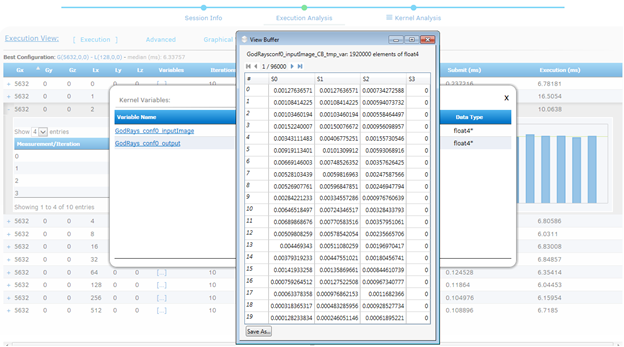Developer Guide for Intel® SDK for OpenCL™ Applications 2017
ID
773042
Date
10/22/2018
Public
A newer version of this document is available. Customers should click here to go to the newest version.
Legal Information
Getting Help and Support
Introducing the Intel® SDK for OpenCL™ Applications
What's New in This Release
Which Version of the Intel® SDK for OpenCL™ Applications Should I Use?
Intel® Code Builder for OpenCL™ API Plug-in for Microsoft Visual Studio*
Intel® Code Builder for OpenCL™ API Plug-in for Eclipse*
Debugging OpenCL™ Kernels on GPU
Intel® SDK for OpenCL™ Applications Standalone Version
OpenCL™ 2.1 Development Environment
Intel® FPGA Emulation Platform for OpenCL™ Getting Started Guide
Troubleshooting Intel® SDK for OpenCL™ Applications Issues
Configuring Microsoft Visual Studio* IDE
Converting an Existing Project into an OpenCL™ Project
OpenCL™ New Project Wizard
Building an OpenCL™ Project
Using OpenCL™ Build Properties
Selecting a Target OpenCL™ Device
Generating and Viewing Assembly Code
Generating and Viewing LLVM Code
Generating Intermediate Program Binaries with Intel® Code Builder for OpenCL™ API Plug-in
Configuring OpenCL™ Build Options
Execution View
The top part of the Execution View enables you to see the tested global and local size best and the worst configurations, based on median execution time. In case only one configuration exists, the result appears in both result windows.
The table below enables you to see statistical analysis results for all configurations. The statistics consists of the following iteration execution time values for the selected configuration:
- Median
- Average
- Standard deviation
- Maximum
- Minimum
Expanding each row in the table enables you to see the total run time, the breakdown to queue, submit and execute times per iteration for the given configuration.

The Execution View provides the following features
- Best configuration in terms of median execution time is marked in blue. Click on the blue summary line on the top of the view to open the results.
- Click the [...] link under the Variables column to view the list of the kernel input/output variables
- Click on a variable name in the list to view the variable content
